1918 - 1988


Private First Class Company B, 34th Infantry
The following information is a first hand account by Ralph: " The unsung heroes of the infantry are the medics, especially the company aid men who were
continually under fire. At one time we went 52 hours without any food and saw 31 days of continuous front line action, and I was wounded in the shoulder
on the next day. Our division landed in the Philippines during the rainy season. We were always wet, either from sweat or rain. We never had any clean
clothes; rations were few and simple. However, after making a flanking attack, the Philippine people helped by carrying rations and supplies, which
augmented those dropped by the air forces. Thirty-six inches of rain fell in a month and we always lived in tents. Sometimes it rained 48 hours without
stopping. We had no fresh milk for 24 months and our food was dehydrated; though at great intervals we sometimes got fresh meat, butter and eggs.
I was wounded while on a ridge where the entire company had been pinned down for 11 hours and I had been down 31 hours. We did not dare to raise
our heads or the enemy would find a target. I saw a machine gun nest and wanted a try at wiping it out, and the minute I moved I was hit in the shoulder.
I was given first aid immediately and then walked six miles to an aid station, through mud, swamp, rice paddies and over mountains. I was then
evacuated by plane to the 105th General Hospital, where three different operations were performed on my shoulder."
Pfc. Hagedorn was discharged July 19, 1945. He received the Presidential Unit Citation, Purple Heart for wounds received on Leyte, November 19, 1944, in the battle of Armoc Valley; an Arrowhead for establishing a beach head, four battle stars for major combats, Infantryman's Combat Badge, and ribbons for National Defense, American Theater, Good Conduct, Asiatic-Pacific Theater and Philippine Liberation.
Married: October 21, 1946 to Martha (Golwitzer) Hagedorn who resides in Manning.
One son, Mark Hagedorn
Ralph was the "voice" of Manning's baseball games for many years.
He also did "play-by-play" for High School Football games shown on Local Channel 2 in the 1980s.
Ralph Hagedorn Writes From Camp
Ralph Hagedorn, son of Mrs. Herman Hagedorn, writes from Camp Wolters, Texas,
where he has been stationed for several months.
"Boy is this army life ever getting good - it is a little more interesting
and it is getting better every day. My mother sent me two of the Monitors and I enjoyed reading them very much.
"The reason I wrote was to let you know that last week we were out on the
range firing the 37 millimeter tank gun for a record.
Out of 52 men that fired in our platoon only 10 of us qualified as expert. We
had to have a 225 out of a possible 300. I got a rating of 225 or expert, with
9 other boys. In our whole company there were 8 of us from Carroll County and I
was the only one to get an expert rating. In our company there are about 230
men and they had 64 expert shooters, so being one of them isn't so bad. We had
to shoot three courses and a possible 100 points was on each course. The
targets were all moving while we were shooting - however it wasn't so bad.
We have been having lots of rain the last few days. We were out on a hike in
the rain for two hours and what I mean we got wet.
As every soldier says, it's time for lights out, in short its bed time."
Pvt. R.H. Hagedorn,
Co. B, 53rd Inf. Trg.,
Camp Wolters, Texas
May 7, 1942, Manning Monitor
Meets Friends Through Monitor
Ralph Hagedorn writes from the Hawaiian Islands to the Monitor as follows:
"I received a letter from the Legion about two weeks ago and have found time to answer it. I thought this would be the best way because nearly everyone gets to read the Monitor. (I hope I get to see it in your column, "Service Men Write"). I want to thank the Legion for the nice letter that they sent me of March 5th, and also the encouraging words. Again I want to thank them for the Monitor, too.
"I received a telephone call sometime ago and found out that it was from an officer. To my surprise it was Donald Musfeldt. He is a second lieutenant in the Coast Artillery and likes his work real well. I talked with him for only a few minutes but three days later I met him personally when I went on pass. It seemed as though I were at home and this was all a dream. I sure was glad to hear from him and see him as well. I stayed with him overnight. We talked of old, times and then I asked him how he, happened to find me and he said he saw my last letter in the Monitor; so even many miles from home there is still no paper better than the Monitor. Then about a week after that I received a letter from Corporal Otto Kruse. He's in the Air Corps about three miles from me. He found me through the Monitor too. I haven't seen Otto yet but I intend to this coming Sunday. It would be very nice if all three of us could get together some time for a little reunion. I know that I sure was glad to see Don and we all hope to meet next month sometime.
"It was through the Monitor that we found each other so far away from home, so in closing I'll say for all of the people to back the Monitor, it's the best paper there is!!"
Everything is going along fine. Work is pretty tough sometimes but that can be expected.
Thanks for everything."
Sincerely, Ralph Hagedorn.
Following is a letter received from Ralph "Hagge" Hagedorn, son of Mrs. Herman Hagedorn, who entered the army some time, ago and is now at Camp Wolters, Texas. He writes.
"I finally have settled down here at Camp Wolters, Texas. This camp is the second largest in the United States. There are about 23,000 boys here from all over the states. I was split from all of my buddies that I came down with. However, they are right next to us so I am not entirely lost. Most of the boys are in the same division as I am the anti-tank. This is considered the most dangerous place in war time, but we Iowa boys CAN TAKE IT!
It didn't take long for me to get acquainted because most of the boys in this division are from Iowa and some from Texas. All of the boys from Texas thinks this is a real country, until we told them about Iowa.
This camp, as well as the rest, gets up early and lights go out early too. They give you plenty of clothes so that you don't get cold but most of the boys have colds because of the weather, which is so changeable. This state is known as Sunny Texas, but we Iowa boys don't think so. We even have to do our work in overcoats.
I find army life very interesting and fit for any young man. The officers that we have are also good. Our boys all have rifles and are going to the range next week. This is to test our marksmanship. I hear they give medals, so I'll do my best as I am the only soldier from Manning down here.
We never have a daily routine to follow, but do different things every day . We do get to see some free shows concerning military service and is very interesting to see. Everything is kept in tip-top shape and must be kept clean. The camp was rated one of the prettiest and one of the cleanest, before the last cycle left. We have pretty yards and buildings. We have a great big field house to play basketball in and have open softball diamonds. Our gym has a seating capacity of about 3,000 people, and can hold three basket ball games at once.
Our food is fairly good but certain things they have a limit to save wasting food. After one gets used to eating the way they do in the army it is not so bad. The food is all good and wholesome.
Our bunks are a soft cot which you have to get used to before you can sleep peaceful. All in all army life isn't so bad. What you put into that is what you are going to get out of it.
So keep 'em Flying,
Pvt. Ralph H. Hagedorn, Company B, 53 Inf., Trg. BN Camp Wolters, Tex.
P. S. I would like to hear from you all."
Honolulu Advertiser (newspaper)
Footsore Scribe Tells Of Trek Over Koolau
September 22, 1942
Trail Narrow, Precipitous
The week's maneuver had also involved a supply unit of several hundred vehicles, and in this respect Col. Cooper was satisfied with results achieved. Trucks, field kitchens, jeeps, guns and so on had moved speedily by day and night, serving the field force. No wheeled vehicles could cross the Koolaus, however. A horse could not have negotiated that trail, nor even a burro, and even a goat might have hesitated. But hundreds of men, carrying packs and rifles, got across with a minimum of "casualties."
When it was over the men themselves differed as to the distance traveled, estimating anywhere from 20 to 1,000 miles; they walked in one day only about 15 miles, but these miles were set on end, perpendicularly, and were marked by knee-deep mud, steep slopes of tangled undergrowth, knife-edged greasy ridges on which the columns tight-roped along the mountain summits, hidden in cloud and swept by rain and wind.
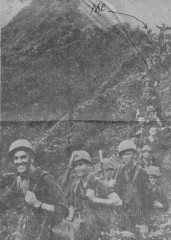
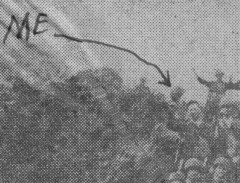
Negotiate Pali
At the outset they negotiated, in single file, a vertical pali, clinging to the green, rain-sodden wall like a column of ants. The rest of the trek was occupied in winding down long ridges from the summit, dipping into forested valleys and climbing out again. Throughout the march the men were alternately soaked by rain and by their own perspiration, and when the sun spasmodically shone they steamed like cabbage in a pot.
This trail, before the war, was occasionally crossed by experienced Hawaii hikers and mountaineers, but civilian climbers do not attempt to keep the steady, rapid pace of such soldiers, nor despite weariness caused by altitude and deep mud try to maintain formation. Yet at the end of the trail above Schofield the battalions and platoons poured out of the mountains on schedule, to the grim "approval of their colonel who, himself a tough and wiry veteran, led the column personally and tossed it off with the remark: "Damned interesting ramble-good exercise."
The men of this regiment did not call it a ramble (they had another word for it), and they deprecated any hint that they might soon meet the enemy in similar surroundings, but they took it in their stride, and though here and there an exhausted trooper dropped out beside the trail to catch his wind and cautiously sample his canteen, they came out still in high spirits, wise-cracking as hard at the finish as at the start.
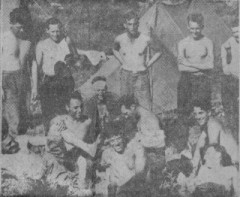
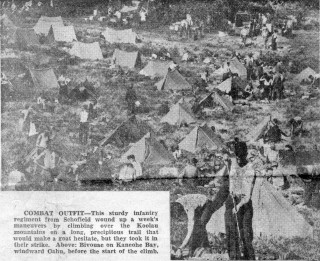
'All Bone and Muscle'
"Those boys are all bone and muscle from the neck down." officers agreed. "And from there up, they know what it's all about." In spots the men slid, rather than walked, down the slopes where the mud lay deep over rocks and wet grass, but no one fell off the pali, no mean record in itself considering the landslides along the way that had blocked the trail at certain points. One soldier slid a hundred feet down from the trail when he misstepped, but managed to halt his decent and scramble unconcernedly back into line, amid much ribbing. "Get the guy a wheelchair," one buddy suggested. But at the end of the trail this same soldier, headed for the showers at Schofield, was wondering if there were still time to dress for a dance at the barracks.
In general, men from the mountainous southern and western states made the best of the trek, one Tennessean avering that back yander he used to take a walk like this every morning before breakfast, to get him squirrelmeat. But even the city boys bore up. One mud-caked, sweating New Yorker, examining a blistered heel during a brief halt in the ferns, told his company commander: "I got no complaints, sir. I'm a volunteer."
A negligible few had to be helped out. The medical units attended to some youngsters mainly suffering from exhaustion, and sent them home in ambulances after the litter-bearers reached the road-head. But there were few stragglers: officers had carefully reminded them that if they were really fighting and marching in such terrain, Japanese snipers would make short work of the ones left behind.
"I'm satisfied," Col. Cooper said when the last man was safely over the hump. "Those boys can go anywhere."
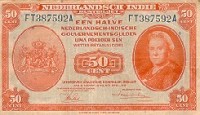

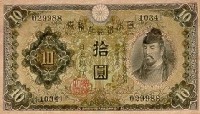
Ralph Hagedorn in New Guinea
Somewhere in New Guinea.
Gentlemen:
Just received seven Monitors today and was more than glad to get them. Thanks to the Monitor and Legion.
Maybe some of you people would like to go on patrol with me today. OK, let's pack up and go. The trail is one that has probably been used by the enemy. We have 15 men with us armed with all kinds of guns. As we move in toward the jungle the trail becomes muddy and the pace is slowed down. Our mission is to reach a village and wipe out all enemy. The time comes when we must go single file, with every move to be made slow and with caution. As we near the village we stop for a short break and get set for the attack. A few of us stay in the rear for protection. All at once you hear a long burst of fire. A grenade goes off, and then you begin to think, could it be an enemy machine gun? Were our own men wiped out? About this time you begin to wonder about many things. We were all ordered to move up. Men were wet with sweet and soaked with mud, with only one thought in their mind they push forward. Rifle fire broke out all over the place. One sergeant cried out, "I got that yellow * * * * --- right between the eyes." A BAR man dropped two more and the men kept firing until the last two Nips came out and gave up. When we were all through we had wiped out 13 Japs and took two prisoners, from which we obtained some valuable information.
The first part of our patrol was completed, so we pushed on up towards a river. However, night caught up with us; so we had to set up a defense for the night. With six other men I went out on outpost to watch the upper part of the trail. Here we made our supper which was a K ration, a few hard crackers and a can of cheese. It was getting dark now so all noise had to be cut down to a whisper. Two of us took turns watching the trail while the rest of the boys tried in vain to catch some sleep. In a few minutes the moon is gone and everything is pitch black. You can't see more than six inches in front of your own face. As I laid down it started to rain, slowly. My thoughts weren't of the rain, because I was wet anyway, but I wondered about some of my own people back home. Wondering what they were doing and how nice it would be to sleep in a soft bed with a good roof over your head. All at once we heard a thud about ten yards from us. Pretty soon someone is standing less than five feet away from us. Because of the thick undergrowth and the blackness of the night we cannot make out who it is. We freeze in our position, finally our supposed-to-be friend said something, at that moment we knew it was a lone Jap. He saw we were Yanks so he took about two steps forward and a M1 rifle barked. When the Jap fell he was less than two feet away from my own feet. He tried to get up as I pointed my carbine at his head, but it jammed; quickly seeing what happened I reversed my gun and hit the Jap a crushing blow over the head. He was already on his hands but after the blow he laid down, never to get up again.
For the rest of the night none of us slept, fearing that more of them may come. Finally, morning came. We took a look at our victim. He had been hit in the side with rifle fire and his head was caved in from my blow. After a small breakfast of crackers and pork and egg yolk we took off up the trail.
The mud began to get deeper. For the next one hundred yards the mud was waist deep. You could see men sweating, cursing and calling the Japs everything possible. We reach the river all tired out, but one short break is all we need. We turned around and went back through all the mud. We never saw any more Japs the rest of our days out. We started back to camp, tired, wet, covered with mud, unshaved and no clean clothes for a number of days, and hungry as could be. As we got close to the ocean we unpacked. With clothes and all on, we jumped in the water to get cooled off. After cleaning up and eating a good hot meal we retired for the day; our mission had been accomplished.
This is only one of the many patrols that we have been on, A life like that is rough, rugged and nerve-wracking. Moments are tense in the jungle and plenty exciting.
Now comes rotation. What is it all about, anyway? We heard about it and often wondered if it had gone into effect yet or not. Most of us have been overseas for about two years working, sweating and fighting for our country. However, the people back home celebrate their annual celebration, drive their car all over as though a war isn't going on. We never think about things as that. Very few of us ever see a movie; no ice cream, no cold cokes or even a cold drink of water. Don't you think we deserve. some of those things too? After what we have gone through I think we deserve more than a rest; so why don't some of you people get busy and see what's holding this rotation plan up. All of us want to see the good old United States once more, so why not give us a hand? Most of you will never realize what is really going on over here. These boys have done more than their part. If you were in their place wouldn't you like to see home once more in uniform? Think it over, folks!
Thanking the Legion and Monitor for their splendid cooperation in sending us the Monitor.
Appreciate it very much.
Respectfully,
Pvt. R. H. Hagedorn.
In Front Lines 31 Days;
Island Fighting Tough
July 19, 1945
Pfc, Ralph Hagedorn (Hagge) son of Mrs. Anna Hagedorn, Manning, has received an honorable discharge from the army with 89 points. He had been in the service since Jan, 31, 1942. He was inducted at Fort Des Moines Feb. 2, 1942, received his basic training at Camp Wolters, Tex., and June 8, 1942, he was on his way overseas where he spent 37 months. He came home Sunday.
He wears the presidential unit citation, the purple heart for wounds received on Leyte, November 19, 1944, in the battle of Armoc valley; an arrowhead for establishing a beach head, four battle stars for major combats, the infantryman's combat badge, and ribbons for national defense, American theater, good conduct, Asiatic-Pacific theater and Philippine liberation.
With 24th Division
Hagge served with the 24th division which has the highest number of landings to their credit in the Philippine islands. He said that his outfit advanced 500 yards without support of artillery fire after they landed on the beach with the combined support of the navy and the air corps. The minute the troops hit the beach this support necessarily has to cease.
He received his jungle training in Australia and later went to Dutch New Guinea, Schouten Islands and the Philippines.
The only Manning boys he saw were Donald Musfeldt, Robert Musfeldt and Otto Kruse, all in Hawaii. He says thanks to The Monitor they all learned that they were within a radius of three miles of each other.
Hagedorn says that the unsung heroes of the infantry are the medics, especially the company aid men, who are continually under fire and who do not receive the credit due them for their service.
During the fighting their lives are not "worth a nickel" for they are constantly exposed to danger.
At one time he said that the men went 52 hours without any food and that at one time he saw 31 days of continuous front line action and was wounded in the shoulder on the next day.
His division landed in the Philippines during the rainy season. "We were always wet," he said, "either from sweat or rain! never any clean clothes; rations were few and simple." However, after making a flanking attack, the Philippine people helped by carrying rations and supplies which augmented those dropped by the air forces. Thirty-six inches of rain fell in a month and they lived in tents always. Sometimes it rains 48 hours without stopping.
They had no fresh milk for 24 months and their food was dehydrated; though at great intervals they sometimes got fresh meat, butter and eggs.
He stated that he was wounded while on a ridge where the entire company had been pinned down for 11 hours and he had been down 31 hours, they did not dare to raise their heads or the enemy would find a target. He says that he saw a machine gun nest and wanted a try at wiping it out and the minute he moved he was hit in the shoulder. He was given first aid immediately and then walked six miles to an aid station, through mud, swamp, rice paddies and over mountains. He was then evacuated by plane to the 105th general hospital, where three different operations were performed upon his shoulder.
Changed and additional diagnoses, operation, with dates:
Ralph Hagedorn
1. Wound, gunshot, caliber unknown, lacerating type, left shoulder, severe, involving the outer portion of the acromion process, incurred when struck by enemy heavy machine gun fire, 19 November 1944, Leyte, P.I.
2. Fracture, compound, complete, comminuted outer portion of left acromion process, incurred as in #1
3. Contracture of joint, left shoulder, severe, only few degrees possible in any direction, secondary to #1
Operation: 27 November, 1944 - manipulation of left shoulder for contracture of.
Anesthesia: IV Sodium Pentothal
LOD: 1 Yes 2. Yes 3. Yes
Disposition: Duty 20 January 1945
John P. Watson, Captain MAC
Surgeon
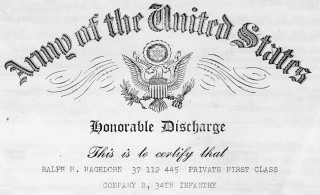
In Memory of Ralph H. Hagedorn
Born February 11, 1918 near Manning, Iowa
Died June 14, 1988 Trimont Hospital, Trimont, Minnesota
Age 70 years, 4 months, and 3 days
The Rite of Christian burial Friday, June17, 1988, 1:00 PM Sacred Heart Church, Manning, Iowa
Celebrant Reverend Father Ralph Reinhart Mass Servers Pat Vollstedt, Jeremy Kasperbauer, Michael Kasperbauer
Interment Sacred Heart Cemetery, Manning, Iowa
Casketbearers Roger Vollstedt, Dave Kusel, Jerome Kasperbauer, Clarence Golwitzer, Arnold Gowitzer, John Golwitzer
Honorary Casketbearers Bill Steneker, Ralph Grundmeier, Merlyn Hargens, Darwins Haskins, Bud Weems, Frank Willis, Charles Schumann
Rosary Thursday, June 16, 1988, 7:30 PM Ohde Funeral Home, Manning, Iowa.
Military Honors Emil Ewoldt Post 22 of the American Legion
Veterans of Foreign Wars Post 3517 Manning, Iowa
Burial will be at Sacred Heart Cemetery in Manning with military honors provided by the Emil Ewoldt Post 22 of the American Legion and the Veterans of Foreign Wars Post 3517.
The Rev. Ralph Reinhart will officiate at the services.
Mass servers will be Pat Vollstedt, Jeremy Kasperbauer, and Michael Kasperbauer.
Honorary casket bearers will be Bill Steneker, Merlyn Hargens, Eldis "Bud" Weems, Ralph Grundmeier, Darwin Haskins, Frank Willis, and Charles Schumann.
Casket bearers will be Roger Vollstedt, Clarence Golwitzer, Dave Kusel, Arnold Golwitzer, Jerome Kasperbauer, and John Golwitzer.
Rosary will be recited at 7:30 p.m. today at Ohde Funeral Home in Manning.
Born February 11, 1918, near Manning, Mr. Hagedorn was a son of Herman and Anna (Kollmetz) Hagedorn. He attended Manning schools and graduated from Manning High School in 1936.
Shortly after Pearl Harbor, he entered the U.S. Army and served until 1945. He was stationed in the Pacific where he was wounded, receiving the Purple Heart.
On October 21, 1946, he was married to Martha Golwitzer at Sacred Heart Church in Manning by the Rev. Roder. After his marriage, Mr. Hagedorn drove a gas truck for his brother-in-law Jake Kuker. He also worked for Norm Kuker and was later employed at Priebes.
In 1955, Mr. Hagedorn and his wife established Ral-Mars variety store in Manning. In the early 1960s a lunch counter was added to the store. The Hagedorns operated the business until they retired in April 1983.
Mr. and Mrs. Hagedorn were fishing near Sherburn, Minnesota, where he suddenly became ill and died on Tuesday.
He was a member of Sacred Heart Parish in Manning and served as church usher. He was a member of the VFW and American Legion in Manning.
Mr. Hagedorn was an avid bowler and he and his wife competed in many tournaments in the area. He bowled in the National ABC Tournament in 1986.
He was active in civic affairs and helped with Manning's centennial celebration.
He supported Manning High School's sports program. Since 1945, he had attended all varsity football and basketball games except for four games he missed when he suffered a heart attack 11 years ago.
He was an announcer and commentator for local softball and baseball games and helped with production of programming on Manning's cable-television access channel.
Mr. Hagedorn is survived by his wife, Martha, of Manning; son, Mark, of Phoenix, Arizona; and two sisters, Goldie Hagedorn of Omaha, Nebraska, and Mary Kuker of Audubon.
He was preceded in death by his parents and one sister, Helen Hagedorn, at age 14.